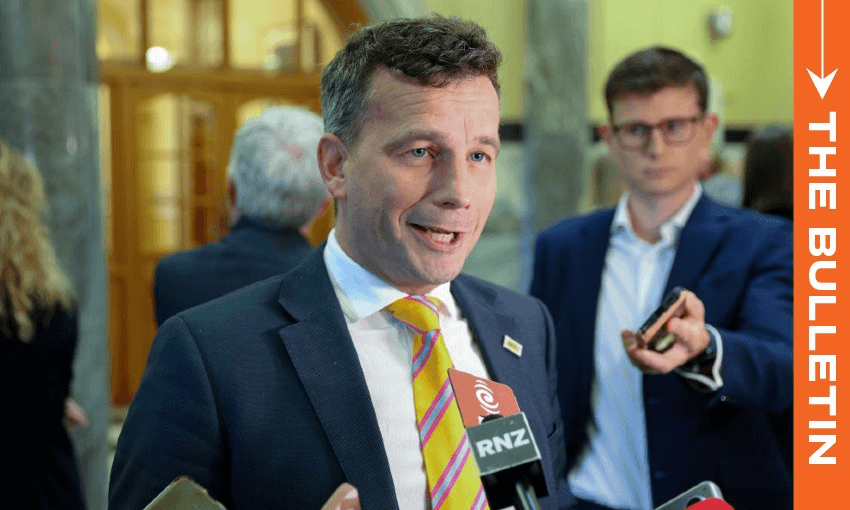The latest headlines on the fledgling ministry have prompted the opposition to call David Seymour a hypocrite, writes Stewart Sowman-Lund in today’s extract from The Bulletin.
To receive The Bulletin in full each weekday, sign up here.
How much?!
Unless you’re glued to what’s going on in politics, you could easily be forgiven for not knowing that we have a Ministry of Regulation. To be fair, it is fairly new – Anna Rawhiti-Connell wrote about its launch for The Bulletin just a few months ago. Since then, the new ministry has been bubbling away in the background as it gets about with its job of regulating regulation. More on that in a moment, but first, there have been a flurry of headlines this week that have little to do with the ministry’s actual work, but more about its operation.
Andrea Vance at The Post reported on Wednesday that despite rising from the ashes of a high profile public sector jobs cull that saw thousands of roles ditched in the name of cost saving, the Ministry of Regulation has quite a few high paying roles. The average salary of its staff is over $150,000. Last week, Vance also reported that the new ministry was hiring a “principal adviser, engagement and communications” – or in Vance’s words, a “spin doctor” – that would be paid almost $170,000.
How we ended up with a red tape ministry
Seymour, who is the minister for regulation, proposed the new ministry as the flagship policy at his party’s election campaign launch last June. At the time, reported the Herald’s Adam Pearse, he said it would involve policing “the rules and regulations ministers are constantly foisting on unsuspecting Kiwis just trying to get ahead”. It ultimately became a coalition policy and the ministry launched in March, with Seymour telling Newsroom’s Emma Hatton that it would operate a bit like Treasury does for government spending.
We have been here before, sort of. Former Act leader Rodney Hide was the ministry for regulatory reform under John Key and as this piece in The Conversation explained last year, Act has consistently pushed for a more embedded approach to regulation dating back to its launch (and even earlier, if you consider Rogernomics). A few weeks back, reported Dan Brunskill at Interest, Seymour expressed his view that the ministry could become as important as the independent Reserve Bank and the Public Finance Act, acting as a third pillar in our country’s economic governance.
‘Hypocrite’
The opposition has appeared relatively indifferent to the ministry since its launch, but has taken severe issue with the reports of high-spending staff. Labour leader Chris Hipkins said that having a “ridiculously large number of people being employed on over $150,000 a year when other public servants are being laid off shows what a hypocrite David Seymour is”, reported RNZ’s Craig McCulloch. The Spinoff’s Lyric Waiwiri-Smith reported recently that close to 6,500 public sector positions have been – or are proposed to be – disestablished.
Green MP Francisco Hernandez, who wrote the parliamentary questions that exposed the salaries in the first place, wryly asked in parliament yesterday whether staffing the new ministry was a “must-have” in comparison to the “nice to have” public servants who had lost their jobs (Nicola Willis called that inference “objectionable”). The Taxpayers’ Union, a lobby group that tends to align with the cost-cutting mentality of the current government, suggested Seymour should be leading by example in “taking on the bureaucratic blob”.
Meanwhile, as an aside, The Spinoff’s Toby Manhire raised an interesting point on the latest episode of Gone by Lunchtime. While Seymour often advocates for cutting down on government waste, he is also overseeing a piece of legislation – the Treaty Principles Bill – that as we’ve talked about this week is doomed to fail. As Manhire argued, that seems “fairly wasteful”.
Where to from here
David Seymour himself has pushed back on concerns over his new ministry, 1News reported, questioning the media’s focus on it. There were more than 200 people in the public service earning between $250,000 and $350,000, he said, and the Ministry of Regulation was “destined to be a lean and effective team”. As The Post noted here, the new ministry will have 91 staff – more than four times the size of the Productivity Commission it replaced.
There are a number of developments on the horizon in the area of regulation. For one, the ministry has two regulatory reviews ongoing – one into the early childhood sector and another into agricultural and horticultural products (with more on the way). More importantly, there is a piece of legislation – the Regulatory Standards Act – that has yet to be passed but was also a feature of the National-Act coalition agreement. The last iteration of this bill was proposed by Seymour and backed by National in 2021 but failed due to Labour’s majority. That won’t be the case this time.


